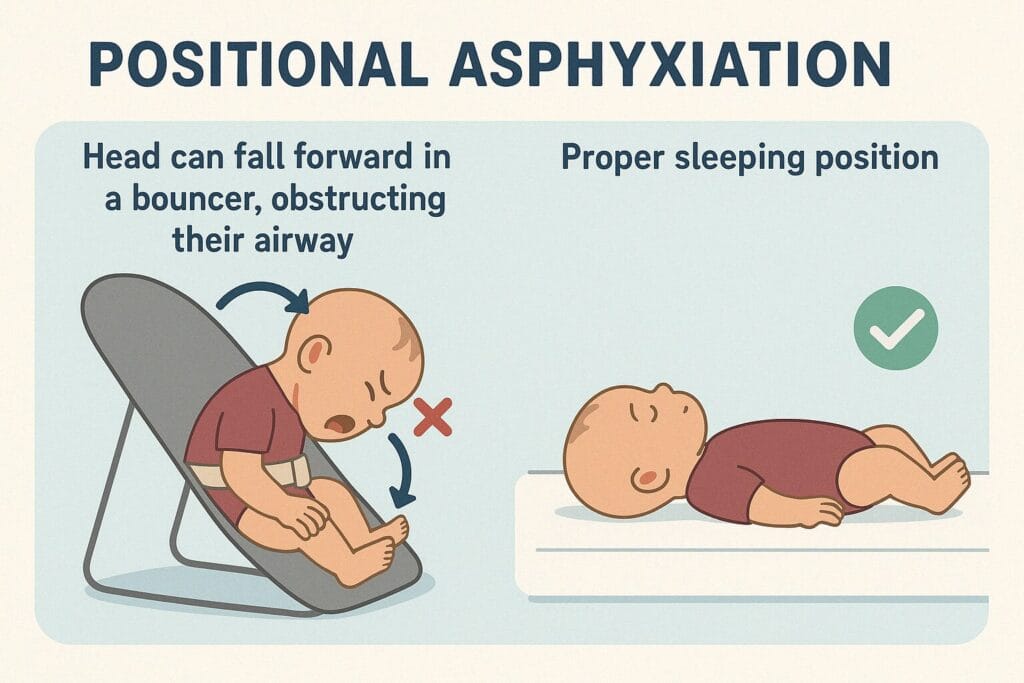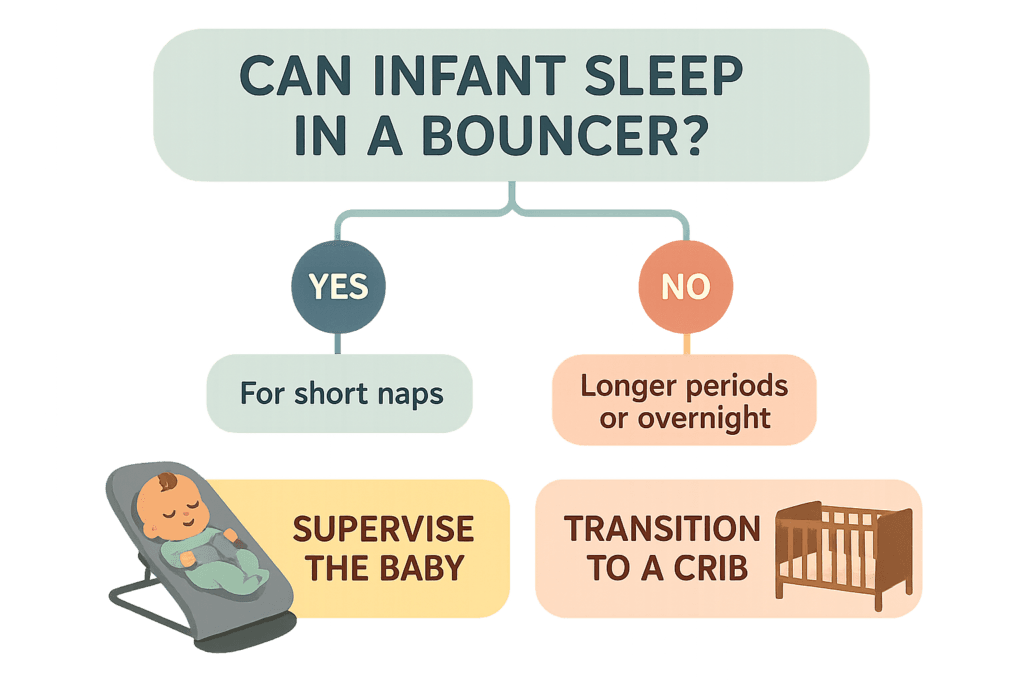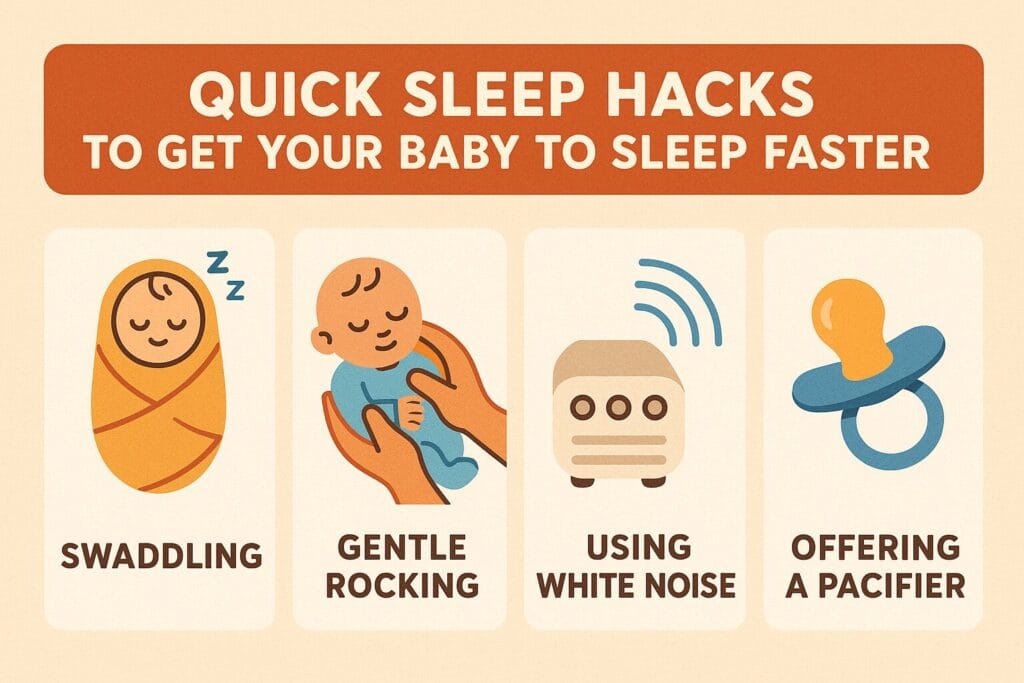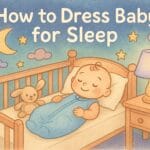As new parents, the question can infant sleep in a bouncer is likely one that arises as you seek solutions for calming and soothing your baby. Bouncers are popular because they can provide comfort and keep your baby close by during the day. However, when it comes to sleep, many parents wonder whether bouncers are safe, especially for extended periods. In this detailed guide, we will answer this common question, examine the risks involved, and explore safer alternatives to ensure your baby’s well-being.
Table of Contents
Understanding Infant Sleep: Why Is It So Important?
Before diving into the question of can infant sleep in a bouncer, it’s important to understand how babies sleep and why it matters. Infants typically sleep between 14 to 17 hours a day. However, their sleep cycles are much shorter than adults, lasting about 50 to 60 minutes, alternating between light and deep sleep stages. This means babies often wake up and need soothing to fall back asleep. Understanding this is key when asking, can infant sleep in a bouncer, as it affects how safe and comfortable that environment can be.
For a baby to sleep safely, they need a sleep surface that supports their body’s development. A bouncer’s design often compromises this, which is why it’s important to explore alternatives to ensure safe sleep practices.
Ideal Infant Sleep Environment
The American Academy of Pediatrics (AAP) provides clear recommendations for infant sleep, suggesting that babies should sleep on a firm, flat surface to reduce the risk of suffocation and Sudden Infant Death Syndrome (SIDS). This brings us back to the question, can infant sleep in a bouncer? Bouncers are not designed to provide the necessary support for safe sleep, particularly as they often feature a reclined or semi-reclined position. These positions do not align with the ideal sleep environment that promotes healthy growth and development.
When considering whether can infant sleep in a bouncer, it’s essential to weigh the risks of using this device for long periods. Cribs and bassinets, on the other hand, are specifically designed to ensure a firm, flat sleeping surface that supports your baby’s back and reduces health risks.
The Risks of Using a Bouncer for Infant Sleep

1. Positional Asphyxiation
One of the biggest concerns when asking can infant sleep in a bouncer is the risk of positional asphyxiation. In a bouncer, babies are often positioned in a semi-reclined posture, which can lead to their head falling forward. This forward head tilt can obstruct their airway, leading to suffocation. Infants are not yet able to lift their heads or reposition themselves to clear their airways, which makes the semi-reclined position of a bouncer particularly dangerous for sleep.
The risk of positional asphyxiation is why can infant sleep in a bouncer is not recommended, especially for extended periods. Even with supervision, the risk is significantly higher when compared to a flat, firm surface like a crib or bassinet.
2. Spinal Development Issues
When asking can infant sleep in a bouncer, it’s crucial to consider the long-term effects on your baby’s spine. Bouncers do not provide the necessary support for healthy spinal development, as they often leave babies in a reclined position for extended periods. The semi-upright posture in a bouncer places undue strain on a baby’s developing back and neck muscles.
Spinal development is critical in the first few months of life, and improper positioning can lead to discomfort and developmental issues. Unlike bouncers, cribs and bassinets provide the flat, firm surface babies need for proper spinal alignment, which is why can infant sleep in a bouncer is not a safe choice for long-term sleep.
3. Risk of Overheating
Overheating is another risk associated with letting a baby sleep in a bouncer. Babies are more vulnerable to overheating because their ability to regulate body temperature is still developing. Bouncers, with their soft padding and lack of proper airflow, can trap heat around your baby’s body, increasing the risk of overheating.
Since overheating is a known risk factor for Sudden Infant Death Syndrome (SIDS), this becomes a serious consideration when asking can infant sleep in a bouncer. Bouncers often lack the breathable materials that a crib or bassinet offers, making it safer to transition your baby to a more suitable sleep surface.
4. SIDS (Sudden Infant Death Syndrome) Risk
When asking can infant sleep in a bouncer, it’s essential to understand the connection between bouncers and the increased risk of SIDS. The AAP recommends that babies should sleep on their backs on a firm, flat surface with no soft bedding. Bouncers, which position babies at an incline and may involve soft fabric and padding, don’t meet these standards.
The semi-reclined position in a bouncer could restrict airflow, increasing the chances of suffocation, especially if the baby is left unattended. When considering can infant sleep in a bouncer for extended periods, parents are exposing their babies to these risks, making bouncers unsuitable for overnight or long naps.
Can Infant Sleep in a Bouncer for Short Periods?

While it’s clear that bouncers are not suitable for extended sleep, many parents ask, can infant sleep in a bouncer for short naps during the day? The short answer is yes, but with caution. Here’s what you should know about using a bouncer for brief naps.
Short Duration Naps
For brief naps, it may be okay to let your baby sleep in a bouncer, but keep the duration short—ideally no more than 30 minutes. This prevents the baby from being in a potentially unsafe position for too long. However, once the nap is over, you should immediately move your baby to a crib or bassinet for safer, longer sleep.
Even when asking can infant sleep in a bouncer for a short nap, always ensure that you’re closely monitoring your baby to avoid risks such as positional asphyxiation and discomfort. Use a bouncer as a tool for soothing, not as a long-term sleep solution.
Supervision Is Crucial
Whenever you use a bouncer for napping, constant supervision is vital. Never leave your baby alone in the bouncer while they are sleeping. Always check their position to ensure their airway remains clear, and be ready to move them to a safer sleeping space if needed. Supervision is key when asking can infant sleep in a bouncer for any period of time.
Struggling with frequent wake-ups due to nutrition deficiency? Discover 5 effective ways to address this issue and improve your baby’s sleep. Click here to learn how proper nutrition can lead to longer, restful nights!
Best Practices for Using a Bouncer with Infants

If you must use a bouncer to calm or soothe your baby, there are best practices to follow to ensure safety. While can infant sleep in a bouncer is not recommended for long periods, it’s essential to know how to use a bouncer properly.
1. Use the Bouncer for Soothing, Not Sleeping
Bouncers are great for calming a baby or providing comfort, but they should never be used as a substitute for sleep. When asking can infant sleep in a bouncer, always remember that a bouncer is designed for temporary use only. For safe sleep, always transition your baby to a crib or bassinet after a short period of soothing in the bouncer.
2. Always Keep Your Baby Secure
Before using a bouncer, ensure your baby is securely strapped in. The safety harness will prevent your baby from sliding or moving out of position. Even with the harness, always monitor your baby’s positioning. If they fall asleep in the bouncer, make sure to move them to a safe sleeping surface immediately.
3. Choose a Safe Bouncer
Not all bouncers are created equal. When asking can infant sleep in a bouncer, it’s important to choose a bouncer that meets safety standards. Look for features such as a firm seat, an adjustable recline option, and secure straps. Make sure the bouncer is stable and doesn’t have any loose parts or hazards. Always ensure that the bouncer is free from excessive padding, as this can pose a suffocation risk.
4. Limit Time Spent in the Bouncer
Bouncers should be used for short periods, and even then, only with close supervision. If your baby falls asleep in the bouncer, transfer them to a crib or bassinet after a brief nap. Long-term use of a bouncer can result in improper spinal development and other risks.
Safe Alternatives for Infant Sleep

If you’re concerned about the safety of using a bouncer for sleep, there are several safe alternatives that offer a more secure sleep environment for your baby. When asking can infant sleep in a bouncer, it’s important to explore these safer options that provide the support your baby needs.
1. Cribs and Bassinets
The safest and most recommended option for infant sleep is a crib or bassinet. These sleep environments provide a firm, flat surface, essential for the healthy development of your baby’s spine. Unlike a bouncer, which may provide a reclined or inclined position, cribs and bassinets help reduce the risks of suffocation, positional asphyxiation, and other dangers associated with using a bouncer for sleep.
The American Academy of Pediatrics (AAP) recommends that babies sleep on their backs in a crib or bassinet for the first year of life. When asking can infant sleep in a bouncer, always choose a crib or bassinet for long-term sleep.
2. Pack-and-Plays and Travel Cribs
For portability, pack-and-plays and travel cribs provide the same safe sleeping environment as a crib. These products are lightweight, easy to transport, and can be used in different rooms of the house or while traveling. Using a pack-and-play or travel crib ensures that your baby sleeps safely on a firm, flat surface. Unlike a bouncer, which is not suitable for extended sleep, a pack-and-play offers a safe, portable option.
3. Baby Swings and Rockers (For Soothing)
If you love the calming effect of a bouncer, consider using a baby swing or rocker. These items provide gentle rocking or swinging motions that can soothe your baby, but they should not be used for sleep. Swings and rockers can help calm your baby, but they do not offer the necessary support for long naps or overnight sleep. Always transition your baby to a crib or bassinet after using these products for comfort.
By opting for safer alternatives, you can ensure that your baby sleeps securely and comfortably. While can infant sleep in a bouncer might seem like an easy solution, cribs and bassinets are always the safest choice for your baby’s health and well-being.
Looking for the perfect pillow to support your baby’s sleep? Check out these 7 essential tips for choosing the best infant side sleeper pillow. Click here to learn how to make the right choice for your baby’s comfort and safety!
FAQS
1. Can infant sleep in a bouncer for a long time?
No, it’s not safe for infants to sleep in a bouncer for long periods. The semi-reclined position in a bouncer can increase the risk of suffocation and positional asphyxiation. The safest place for your baby to sleep is on a firm, flat surface like a crib or bassinet. Can infant sleep in a bouncer is a common question, but the risks outweigh the convenience for extended sleep.
2. Can infant sleep in a bouncer for short naps?
Yes, a baby can sleep in a bouncer for short naps, but this should be for brief periods—no longer than 30 minutes. Always supervise your baby when they sleep in a bouncer, and transfer them to a crib or bassinet for longer sleep. So, while can infant sleep in a bouncer for short naps is possible, it is not recommended for extended periods.
3. Can infant sleep in a bouncer overnight?
No, infants should not sleep in a bouncer overnight. The reclined position of the bouncer poses a suffocation risk, as the baby’s airway can become blocked. When asking can infant sleep in a bouncer overnight, the answer is no. Always transfer your baby to a crib or bassinet for safe, overnight sleep.
4. Can infant sleep in a bouncer if they are strapped in securely?
Even if your baby is strapped securely in a bouncer, it is not recommended for long-term sleep. The incline of the bouncer can still cause your baby’s head to slump forward, obstructing their airway. When asking can infant sleep in a bouncer, it’s important to remember that bouncers are not designed for safe, extended sleep.
5. Can infant sleep in a bouncer with a vibrating feature?
No, the vibrating feature in a bouncer does not make it safe for sleep. While vibrations can soothe a baby, they do not provide the proper support for safe sleep. If you’re asking can infant sleep in a bouncer with vibration, it’s still not advisable for extended sleep. Always transfer your baby to a crib or bassinet after brief use of the bouncer.
6. Can infant sleep in a bouncer if they have reflux?
Although some parents use bouncers for babies with reflux to keep them slightly inclined, this is not a safe long-term solution for sleep. The incline can still cause discomfort or breathing difficulties, and the bouncer does not provide the necessary spinal support. So, can infant sleep in a bouncer with reflux? It’s not recommended for sleep.
7. Can infant sleep in a bouncer if they fall asleep in it?
If your baby falls asleep in a bouncer, it is crucial to move them to a safe, flat surface such as a crib or bassinet as soon as possible. The short answer to can infant sleep in a bouncer is no, even if they fall asleep there. Bouncers are not suitable for long-term sleep, and babies should always be placed on a firm, flat surface.
8. Can infant sleep in a bouncer while being monitored?
While you can monitor your baby when they sleep in a bouncer, it’s still not safe for long periods. Can infant sleep in a bouncer with supervision? Yes, briefly—but you should never leave your baby unsupervised in a bouncer while sleeping. Always transfer them to a crib or bassinet for longer sleep to ensure their safety.
9. Can infant sleep in a bouncer if they are well-supported?
Even if your baby appears well-supported in a bouncer, it is still not safe for sleep. The reclined position can affect their airway and spinal development. The answer to can infant sleep in a bouncer is no, even if the bouncer feels comfortable. A crib or bassinet is always the safest place for your baby to sleep.
10. Can infant sleep in a bouncer for a quick nap while traveling?
While traveling, a bouncer may be a convenient option for soothing, but it is still not ideal for sleep. If your baby is asking can infant sleep in a bouncer for a quick nap, you should limit the nap to 30 minutes and transfer them to a crib or bassinet for safer sleep. Use a portable crib or pack-and-play as a safer travel sleep solution.
Conclusion: The Final Answer to “Can Infant Sleep in a Bouncer?”
So, can infant sleep in a bouncer? While bouncers are often used to soothe a fussy baby, the answer is clear—no, infants should not sleep in a bouncer for extended periods. While bouncers may help calm your baby, they are not designed for safe, long-term sleep. The reclining position and lack of proper support can increase the risk of suffocation and breathing difficulties.
When considering can infant sleep in a bouncer for a nap or overnight, it’s important to prioritize your baby’s safety. Cribs and bassinets, on the other hand, offer a flat, firm surface that supports spinal development and reduces the risks associated with bouncers.
Choosing the right sleep environment is key to your baby’s health. While can infant sleep in a bouncer might seem like a convenient option, it’s important to use safe sleep practices for your baby’s well-being. Opting for a crib or bassinet ensures that your baby is sleeping on a safe, flat surface, providing them with the best conditions for healthy sleep and development.
Remember, can infant sleep in a bouncer might be tempting, but safe sleep practices are always the best choice for your baby’s long-term health. Make sure your little one gets the restful, secure sleep they need, and rest assured knowing you’ve made the safest choice for their well-being.



